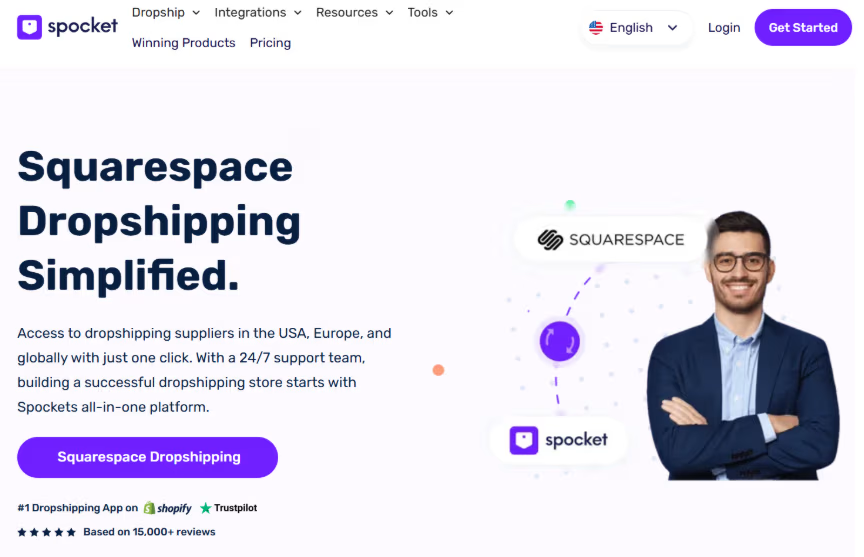In 2025, choosing the right eCommerce website building platform is critical for the success of your online business. Whether you're a small startup or an established enterprise, the platform you use will directly impact your store’s performance, scalability, and customer experience. From user-friendly interfaces to advanced features for customization, there are various options to consider. But with so many platforms available, how do you know which one is the best fit for your business?
In this guide, we’ll explore the top eCommerce platforms of 2025, comparing their key features, pricing, and ease of use. Whether you want to build a store from scratch, sell on multiple channels, or optimize for mobile devices, the right platform can make all the difference. Let’s dive in and discover the best options to power your online business in 2025!
What is an E-commerce Store?
An e-commerce store is a digital platform where businesses can sell products or services online, reaching customers globally without needing a physical storefront. These stores operate through websites or apps, allowing customers to browse, compare, and purchase items conveniently from their devices.
E-commerce stores can be tailored to fit various business models. For instance, you can sell physical goods, digital products, or subscription services. Popular platforms like Shopify, WooCommerce, and BigCommerce make setting up an e-commerce store easy, offering features like payment gateways, inventory management, and shipping integrations.
Unlike traditional brick-and-mortar stores, e-commerce stores are accessible 24/7, providing a seamless shopping experience for customers across different time zones. They also enable businesses to leverage analytics, personalized recommendations, and automated marketing tools to optimize their operations and drive sales.
With the rise of mobile commerce, social media shopping, and AI-driven personalization, e-commerce stores are no longer optional—they’re essential for businesses aiming to thrive in the digital age whether a small business owner or enterprise retailer, an e-commerce store provides the flexibility and scalability to grow your brand and cater to your audience effectively.
Benefits of Building an E-commerce Store to Drive Sales
Building an e-commerce store offers numerous advantages for businesses aiming to boost sales and expand their reach. Here are some key benefits:
- Wider Market Reach: An e-commerce store allows you to sell to customers globally, breaking the geographic limitations of a physical store. This increases your potential customer base and opens up new revenue streams.
- Cost Efficiency: Operating an online store is significantly cheaper than maintaining a physical storefront. You save on rent, utilities, and staffing while benefiting from automated tools that streamline operations.
- 24/7 Availability: E-commerce stores are always open, enabling customers to shop conveniently. This constant accessibility increases sales opportunities, especially with automated customer support tools.
- Data-Driven Insights: E-commerce platforms provide access to valuable customer data, helping you understand purchasing behaviors, preferences, and trends. These insights allow you to make informed decisions and create targeted marketing strategies.
- Personalization Opportunities: Online stores enable businesses to offer personalized shopping experiences through tailored product recommendations, dynamic pricing, and exclusive discounts based on user behavior.
- Scalability: As your business grows, your e-commerce store can quickly scale to handle increased traffic, new product lines, and expanded markets.
Why Choosing the Right Website Builder Matters
A well-designed website can significantly impact a small business's success by boosting credibility, improving customer engagement, and driving sales. In fact, 75% of consumers judge a company’s credibility based on its website design, according to studies. This means that if your site doesn’t look professional or doesn’t function well, potential customers might doubt your business's legitimacy and choose a competitor instead.
Choosing the right website builder ensures that your website is both professional and user-friendly. The right builder will give you access to tools that allow for customization, quick updates, and optimization for various devices. A builder with built-in SEO capabilities can also increase your visibility, helping you attract more visitors through search engines.
Conversely, opting for the wrong platform can lead to poor user experiences. Problems like slow loading times, unresponsive designs, and lack of mobile compatibility can frustrate visitors, leading to higher bounce rates and lower search engine rankings. This can translate to decreased traffic, missed sales opportunities, and ultimately lost revenue.
Top 5 Ecommerce Website Building Platforms
Choosing the right eCommerce website building platform is crucial for the success of your online store. In 2025, the variety of platforms available can make this decision overwhelming. Each platform offers unique features, flexibility, and scalability, catering to different business needs, from small startups to large enterprises.
In this section, we will break down the top 5 eCommerce platforms that stand out in 2025. These platforms are selected based on ease of use, customization options, pricing, and customer support. Whether you're just starting out or scaling up, these platforms will provide you with the tools and features to grow your business, optimize the shopping experience, and streamline your operations.
1. Wix
Wix is a leading website builder known for its user-friendly interface and flexible design options. It boasts over 200 million users and offers an intuitive drag-and-drop builder perfect for small business owners without technical expertise.

Key Features
- Over 800 customizable templates that cater to various industries
- Built-in SEO tools, including custom URLs, meta descriptions, and image optimization
- The Wix App Market, offering third-party integrations to extend functionality
- Mobile optimization to ensure your site looks great on all devices
Pricing
Basic business plans start at $16/month, with more advanced plans offering additional features.
Example Use Case
A boutique owner can create a visually stunning online store that showcases products, includes customer testimonials, and integrates a blog section—all without needing to write a line of code.
Pros
- Extremely easy to use with a shallow learning curve
- Access to extensive customization options
- Robust support with tutorials and 24/7 customer service
Cons
- Once a template is chosen, it cannot be changed without rebuilding the site
- The free plan includes Wix branding, which can be unprofessional
Ideal For
Entrepreneurs and small business owners who prioritize design flexibility and ease of use.
2. Weebly
Weebly is a budget-friendly, easy-to-use website builder that’s great for small businesses just starting out. It offers a simple drag-and-drop builder and is known for its straightforward, clean designs.
Key Features
- Free and low-cost plans available, ideal for tight budgets
- Mobile-responsive templates and a user-friendly interface
- Built-in SEO tools and analytics to track site performance
- Basic e-commerce functionality with the ability to sell products
Pricing
Free plan available; paid plans start at $10/month.
Example Use Case
A local repair service can build a simple, yet professional website showcasing their services, pricing, and customer reviews using Weebly’s easy-to-use platform. According to a 2016 report by Marketingdive, 53% of mobile users abandon sites that take over 3 seconds to load. Weebly’s mobile-responsive templates help ensure fast loading times.
Pros
- Very user-friendly with a low learning curve
- Budget-friendly plans suitable for startups
- Good for basic e-commerce needs
Cons
- Limited customization compared to more advanced builders
- Less powerful design tools compared to Wix or Squarespace
Ideal For
Small businesses and startups needing a simple, cost-effective solution.
3. Squarespace

Squarespace is known for its sleek, modern templates and comprehensive features that cater to creatives and small business owners who want a visually appealing website. It powers millions of websites and is well-regarded for its attention to design detail.
Key Features
- High-quality, mobile-responsive templates designed to stand out
- All-in-one platform including hosting and domain registration
- Built-in SEO and analytics tools for data-driven decisions
- Strong e-commerce capabilities, including product pages, checkout, and inventory management
Pricing
Plans start at $16/month, with the $23/month Business plan offering more robust e-commerce features.
Example Use Case
A small photography business can showcase its portfolio using Squarespace’s elegant templates, making it easy for potential clients to browse, book, and contact them.
Pros
- Eye-catching, professional-looking templates
- Great for businesses focused on image-heavy or creative work
- Built-in e-commerce features to support online sales
Cons
- More limited in terms of third-party app integrations compared to other platforms
- Can be pricier for small business owners on a budget
Ideal For
Creative professionals and businesses looking for a high-quality, aesthetic website with integrated e-commerce.
4. Shopify
Shopify is a top choice for small businesses focused on e-commerce. With over 4.4 million active websites, Shopify is known for its powerful e-commerce capabilities, making it a great fit for any small business looking to sell products online.

Key Features
- Easy-to-use platform with dedicated e-commerce functionality
- Built-in payment processing with support for multiple currencies
- Advanced analytics and reporting tools
- Access to thousands of apps and integrations for extended functionality
Pricing
Plans start at $39/month for basic e-commerce features, with more advanced plans available for growing businesses.
Example Use Case
A small business selling handmade crafts or specialty items can leverage Shopify’s platform to manage their entire online store, from product listing to secure payment processing.
Pros
- Strong focus on e-commerce with advanced tools
- 24/7 support to address any technical issues
- Secure platform with built-in fraud analysis
Cons
- Monthly costs can add up, especially with additional apps
- Customization may require coding skills for more advanced changes
Ideal For
Small businesses focused on product sales that need a reliable and robust e-commerce platform.
5. WordPress.com
WordPress.com combines the power of the world’s most popular content management system (CMS) with the ease of a website builder. It’s perfect for small businesses that need a content-focused site with scalability options.
Key Features
- Thousands of plugins for enhanced functionality
- Wide variety of themes with free and premium options
- Built-in SEO tools to help boost your rankings
- Strong blogging capabilities and content management features
Pricing
Free to start, with premium plans starting at $4/month. Business plans with advanced features begin at $25/month.
Example Use Case
A small local news site or blog can utilize WordPress.com’s powerful blogging tools to keep readers engaged and informed. Over 43% of all websites on the internet are powered by WordPress, making it a trusted choice for content-heavy sites.
Pros
- Highly customizable with the ability to scale as your business grows
- Extensive plugin library for added functionalities
- Great for blogging and content-rich sites
Cons
- Slight learning curve for non-tech-savvy users
- Advanced customization often requires coding knowledge
Ideal For
Small businesses that focus heavily on content and want the ability to grow and scale over time.
The Role of Website Builders in Customer Engagement and Trust
Customer engagement is key to the growth of a small business, and a website plays a huge role in this. A well-constructed site can include interactive elements such as contact forms, embedded videos, live chat, and social media integration. Website builders that support these features make it easy to create an interactive, engaging experience that keeps visitors on your site longer.
Trust is also closely tied to engagement. When a potential customer visits your website, they subconsciously evaluate its credibility within seconds. Poorly designed websites with outdated themes, broken links, or incomplete information can lead visitors to mistrust your business. The right website builder helps prevent these pitfalls by offering modern templates, built-in maintenance tools, and security features.
Tips for Choosing the Best Website Builder for Your Business
Selecting the right website builder is a pivotal decision for the success of your business, whether you’re launching an eCommerce store, a blog, or a portfolio. The platform you choose will influence everything from your site’s design and functionality to its performance and user experience.
In this section, we’ll explore key tips and factors to consider when choosing the best website builder for your business. We’ll cover important considerations such as ease of use, customization options, scalability, pricing, and support. With the right builder, you can create a site that not only looks professional but also helps drive conversions and grow your business. Let’s dive into these tips to ensure you make an informed and strategic decision.
1. Ease of Use
For a small business owner, time is valuable. Opting for a website builder with a user-friendly interface can save hours of work and make website management simpler. Drag-and-drop builders, intuitive dashboards, and built-in tutorials are all signs of an easy-to-use platform. For example, Wix and Weebly are renowned for their ease of use, allowing even those without technical skills to build a site quickly.
2. Customization Needs
Your website should reflect your brand's unique identity. Choosing a website builder that allows for flexible design and coding options is essential if you want a truly personalized look. Squarespace and WordPress.com offer extensive customization capabilities, making them ideal for businesses that need more design freedom. Ensure that the builder provides various templates and options for altering colors, fonts, layouts, and more.
3. SEO Tools
Visibility on search engines like Google is vital for drawing organic traffic to your website. When choosing a website builder, check that it includes built-in SEO tools. Features such as meta tag editing, custom URLs, sitemaps, and image alt text can enhance your site's discoverability. WordPress.com is highly recommended for its robust SEO features, and Wix also provides excellent built-in SEO options that can help you optimize your content.
4. Mobile Responsiveness
With more than 50% of web traffic now coming from mobile devices, having a mobile-responsive site is non-negotiable. A mobile-responsive website adapts its layout based on the screen size, providing a seamless experience for users on smartphones or tablets. Website builders like Squarespace and Shopify ensure that all their templates are mobile-friendly, helping businesses avoid high bounce rates due to poorly optimized mobile sites.
5. Budget
Cost considerations are always important for small businesses. Look at what features are included in each website builder's pricing plan. While platforms like Weebly offer free plans with limited functionality, others like Shopify may have higher costs but provide more advanced e-commerce features. Keep in mind that additional expenses, such as premium templates or plugins, can also add up. Always match the platform’s pricing to your budget, ensuring you get the features you need without unnecessary extras.
6. Scalability
Choose a website builder that can grow with your business. If you're starting small but anticipate expansion in the future, opt for a builder that supports scalability. WordPress.com, for instance, can transition from a simple blog to a comprehensive e-commerce site with just a few plugins. Ensuring your builder can adapt to new functionalities—like adding a shopping cart, appointment scheduling, or multilingual support—means you won’t need to migrate to a new platform as your business scales up.
7. Customer Support
Reliable customer support can make a big difference, especially if you're not tech-savvy or don’t have an IT department. Before committing to a platform, review their customer service options. Builders like Shopify offer 24/7 customer support through various channels, while others may only offer email support or limited chat hours. Knowing help is available when needed can provide peace of mind and prevent potential downtime for your site.
Conclusion
Hopefully, this breakdown of top website builders has helped you see that launching a business doesn’t have to be complicated. Whether you’re drawn to user-friendly drag-and-drop editors or advanced analytics, there’s something here for every stage of your e-commerce journey. Just remember to weigh factors like available integrations, transaction fees, and brand restrictions as you choose the right platform.
With the right tools in place, you can focus on finding winning products and delivering great customer experiences. Ultimately, the perfect platform is the one that aligns with your business goals, giving you the flexibility and support needed to succeed.





















